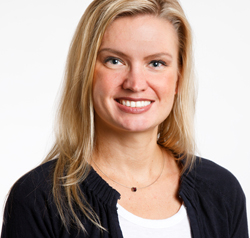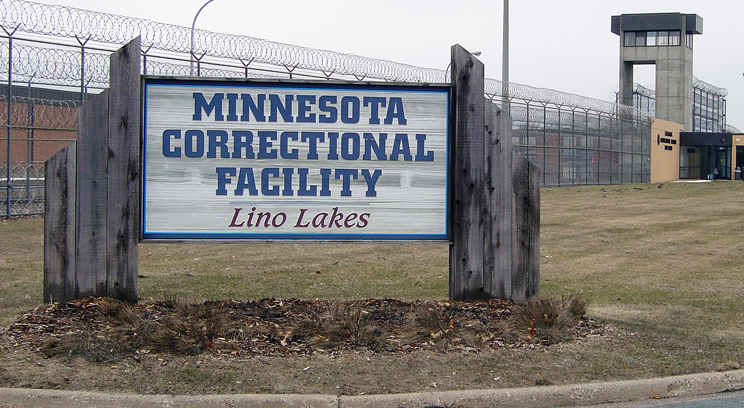Life happens
So how does a young woman from Prior Lake, with three degrees from the University of St. Thomas, end up in prison?
Life happens. While Holly Hanson ’00, ’08 M.A., ’12 Psy.D. was busy making other plans – to become a therapist and a psychologist in the mental health field – her focus changed to the field of corrections during an internship at the Minnesota Correctional Facility-Stillwater.
Today, she is a clinical program therapist within the Sex Offender Treatment Program at the Minnesota Correctional Facility-Lino Lakes.
“I would have never guessed that I would ever work in a correctional facility,” Hanson said in a recent interview. “I didn’t enter this field thinking that I would work in a prison, and I’ve been pleasantly surprised.”
Interprofessional Center for Counseling and Legal Services
Hanson was introduced to the integration of legal concerns and the provision of psychological services through St. Thomas’ Interprofessional Center for Counseling and Legal Services. Before finishing her graduate studies, Hanson had participated in several practica, and the IPC was one of them.
According to the IPC website, it is “among the first in the country through which faculty, staff and students from law, psychology and social work collaborate to help clients in need. At the same time, students from all three disciplines gain practical experience working on real cases, learning skills that will serve them well in their future careers.”

Holly Hanson is a clinical program therapist within the Sex Offender Treatment Program at the Minnesota Correctional Facility-Lino Lakes, a job she has held since Sept. 25, 2012. (Photo by Mark Brown)
Between 2000 and 2004, following her graduation from St. Thomas, Hanson worked in a group home with adults diagnosed with a mental illness or who had a dual diagnosis of mental illness and chemical dependency. Between 2004 and 2007 she was a clinical interviewer at the Minnesota Center for Twin and Family Research at the University of Minnesota. She was always open to new experiences but she never imagined a career in corrections.
“I think that’s why during my graduate school training I tried a lot of different types of practica,” she said. “I trained in a private practice, in a hospital and in a college counseling center. I trained in the IPC, and then I ended up in a correctional facility. I was just kind of sampling different areas. I knew I wanted to use a variety of my skills. I knew I wanted to be involved in many different areas of the field. I just didn’t know what location or what type of ‘population’ I would work with.”
Hanson credits the IPC for introducing her to variety in her career, which was useful in her internship at Stillwater. She also credits the IPC for fostering the skills she uses today. “It really enhanced my growth in a way that my other experiences hadn’t,” she remarked. “I definitely learned from each one, but the IPC is so dedicated to the student experience that I just really found it was what I needed at the time.”
The IPC gave her a place to practice the skills and implement what she had been learning throughout her graduate studies, and “the two together were really a powerful experience and gave me the foundation from which to go almost anywhere.”
Hanson found the internship at Stillwater rewarding, and she began looking for openings in correctional facilities. Nothing was available in the mental health field at the time, but there was an opening in the sex offender treatment program at Lino Lakes, just 20 miles north of campus.
On the job in Lino Lakes
Hanson began her career in corrections on Sept. 25, 2012.
“It was definitely outside of my comfort zone, but I had worked with men at Stillwater who had committed sexual offenses,” Hanson said. “I had foundational skills, so I thought I’d give it a shot and see what happens. I was offered the job, and I was informed that it was the foundational clinical skills that made me someone they wanted to bring into the system; the belief was that I could pick up the specific sex offender treatment skills pretty easily along the way.”

Security measures at the Minnesota Correctional Facility-Lino Lakes include double fencing and several layers of barbed wire.
Her responsibilities include running a sex-offender treatment group, which involves group and class work, as well as some work with individuals, and teaching classes such as Personal Victimization, her first class. The class helps inmates deal with their own traumas, which could be anything from physical abuse to verbal abuse to sexual abuse to neglect. “This class is a way to enhance coping skills and process that,” Hanson said.
A challenge she faces is learning a new skill set, learning more about sex offender treatment rather than focusing on a lot of the mental health issues that she had worked on previously in her career. She still uses the foundational clinical skills that she developed in her studies and practica, but now she is learning how to tailor those skills to sex offender treatments.
They include “an openness. I bring an ability to build rapport. I bring an interest in people, others, and a motivation to learn. And I think my approach can really help to make an environment in which people are willing to speak and feel comfortable. I think that’s really, really helpful in this field.”
In addition to the work being rewarding, she has found that it is no more stressful than other places she has worked, and security personnel are always within earshot.
(Lino Lakes Daily Inmate Profile Report)
A St. Thomas resume
Hanson is one of a handful of alumni who holds three St. Thomas degrees. She has a different reason for earning each at St. Thomas:
- Undergraduate: “For some reason St. Thomas stood out. I really liked the facilities. I wasn’t sure what I was going to major in at that point. I wasn’t drawn to a specific school, but I knew I wanted smaller class sizes, and I wanted more interactions with the professors.”
- Master’s: Hanson looked at various clinical programs around the country but found them too focused on research and not focused enough on the counseling skills involved in therapy, which was her area of interest. “When I got into the master’s program I just really enjoyed the curriculum, the faculty and the student body.” Staying close to home also was a factor.
- Doctorate: Hanson, while considering a Ph.D. degree rather than a Psy.D. degree, looked at other schools but again found them too focused on research rather than on honing counseling skills. And married (to a Tommie) with three children, she wanted to remain close to home. “When I got into the master’s program I knew pretty quickly that it was a really good fit for me and it was offering what I was looking for both with the students that I was with and the faculty. I knew I wanted to continue.” She earned her doctoral degree in August 2012.
Looking to the future
“I really do like my work,” Hanson remarked. “I don’t see myself leaving anytime soon. … I’ve been happy with the direction that my career has taken.”
Clinical program therapist is an entry-level position. Hanson is working toward becoming a licensed psychologist, which requires, in addition to a doctoral degree, one year of supervised work and passing two tests. (She has passed the state ethics test and is studying for the national test.)
Eventually she may look at other positions as she advances in her career. “While I see myself moving on from my current position,” she said, “I would like it to be within the Department of Corrections.”
* * *
Editor's note: The Minnesota Department of Corrections offers training opportunities for students as practicum students and interns within chemical dependency treatment, sex offender treatment and general mental health areas. Careers also are available within each of these areas. Entry-level positions allow for opportunities to receive supervision while working toward licensure at the master's or doctoral levels. For more information about internships and careers, visit the Department of Corrections website. For more information about counseling psychology at the University of St. Thomas, visit the College of Education, Leadership and Counseling website.







